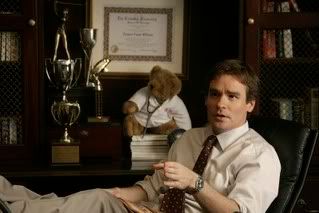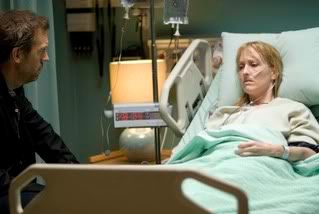| FAQ/Help |
| Calendar |
| Search |
| Today's Posts |
 |
|
| ALS News & Research For postings of news or research links and articles related to ALS |
advertisement
| Reply |
|
|
Thread Tools | Display Modes |
 |
|
| ALS News & Research For postings of news or research links and articles related to ALS |
| Reply |
|
|
Thread Tools | Display Modes |
|
|
#1 | |||
|
||||
|
In Remembrance
|
The Metaphorical Medicine of House
Written by Diane Kristine Published January 06, 2008 He paces hospital corridors, juggles office implements, twirls his cane, fidgets with elastic bands, plays with that oversized ball, pops another Vicodin, interrogates his team, writes on his white board, sometimes even visits a patient. Dr. Gregory House brings the act of thinking to kinetic life each week, a remarkable achievement for a visual medium like television.  "I was very impressed with House from the beginning for what they were trying to do," said Dr. Lisa Sanders, a faculty member of the Yale School of Medicine and technical advisor for the series. "What they're really looking at is how doctors think, and it's not really a television-friendly topic." Sanders, an Emmy-winning broadcast journalist before turning to medicine, has been part of the show since before it was a show. Her Diagnosis column in the New York Times inspired executive producer Paul Attanasio, who sold the show to Fox as a medical procedural before creator David Shore would turn it into equal parts character study. When Attanasio told Sanders the show depended on this rude and obnoxious man people seemed to love, her first thought was "Good Lord, I'm not going to be employed for long." "It would be a different show if Hugh [Laurie] were a different actor," she said. "I think he's really an incredible talent and it's because of him and because the writing is extraordinary that I was wrong." Even a scientist isn't immune to the irrational charms of the show's leading man. "House is such a damaged character. He's such an unreliable narrator that his personal affectation of being a total schmuck is belied by the warmth and generosity in his face," she explained. "You look at his face and he might be saying the meanest thing ever, and you know that inside there is a deeply caring person. Even if he's not caring about you as an individual, he cares about an idea that happens to be important to you too, which is figuring out what's going on. I think the genius of Hugh Laurie is that he's able to get that duality across." Sanders, who provides the writers with the fact-based story ideas they crave and gives her expert opinion on the medicine in scripts, is pragmatic about her role with the show. "Sometimes if it's a choice between drama or comedy and complete accuracy, accuracy loses. I understand that. But I'm there to be the voice promoting accuracy, so I point it out and they either take it or not," she seemed to shrug. "It's hard to criticize their sense of drama and character." She did give an example of a stand she took on a line in a script meant to imply sexual contact between two characters, a line that violated the precise terminology she holds dear about medicine. "I wrote them an e-mail and I said you can't have bacterial vaginosis in your mouth. First of all, it doesn't grow there. But more importantly, it wouldn't be called bacterial vaginosis if it were in your mouth." "So they were like, 'That's very nice, but this is way funnier.' And you know, it was. What can I say? I fought the battle for linguistic purity and I lost to prurient humour and it was funny." She says the House writers are so sophisticated now, with the show in its fourth season, they rarely unwittingly make errors. "There are some shows that probably adhere more closely to the way things are, but I think that's because their focus is on a different thing. House is really about figuring stuff out," she asserted. "It's true that House takes liberties with the truth – you know, bacterial vaginosis – but I think it's usually in an effort to do a show about thinking." Dr. Scott Morrison, a physician in Illinois, writes reviews of House that focus more on the accuracy of the medicine than angst over the damaged doctor's dark soul or who flirted with whom – though he doesn't ignore those important areas, either. Far from an indignant list of nitpicks, his Polite Dissent reviews are written with obvious affection for the series. Perhaps surprisingly, he remains impressed with House's accuracy. "House is probably the most accurate of the current crop of medical television shows, and definitely well above average for the genre," he said in an e-mail interview, in which he shared Sanders' opinion that entertainment does and should trump accuracy. "It’s simply not possible for them to be 100% accurate and remain a finely tuned drama. When I point out errors, especially the smaller ones, it is not so much to detract from House as it is to let my readers know what they should expect in real life." In real life, as Morrison points out, "tests results often take days to come back and the results are rarely as clear cut as House or other television shows make them out to be."  In real life, as Sanders points out, oncologists don't perform surgery. Plus, she said, "I have never touched the controls of an MRI. In fact, if I did, I would certainly be called before the CEO of Yale-New Haven Hospital: 'I understand you were touching our $6 billion MRI?'" "I have never broken into any of my patients' houses," she added dryly. "I have on occasion made house calls, but I ring the doorbell and if they're not home, I come back later." Yet she brings this up not simply as a critique, but rather a way of illustrating the show's metaphorical take on medicine. "One of the things we do, one of the great pleasures of being a doctor, is you get to ask all these incredibly nosy, intrusive questions," Sanders said. "People can feel extremely violated with intimacy. Of course, it's part of a trusting relationship, you hope, but you probe into the inner recesses of their personal life as if you were breaking into their house." "Their propensity to break into houses is a perfect visual representation, a psychological representation, of what we're doing," she continued. "I love that." Sanders is also impressed by the fact that a House episode unfolds the way a hospital admissions note does. "We call it an H&P, history and physical, even though it includes much more than a history and physical," she explained. "All my columns follow that very rigid format. And House also follows that rigid format." The teaser, for example, sets up how the illness presented and information about a patient's age and social situation. Then, as in the Diagnosis column, House progresses through symptoms, investigations, and finally a resolution. The difference is that Sanders as narrator is far more personable and far less prone to insults than House. She is obviously an enthusiastic fan of the show that employs her, but not an apologist for it. "There are things about House that rub against what I think a good doctor is. And certainly I am way nicer to my patients," she laughed. "There are some things I hate about the House character. Some of the things I love about medicine, the character of House doesn't value at all." Two examples she gives are taking a patient history and doing a physical exam, things House rarely does, and never does well. House doesn't respect much, but he respects rationality above all. Yet Sanders isn't impressed by his empirical method, either. "House is what the world would be like if nobody practiced evidence-based medicine," Sanders said, deploring his refusal to check for evidence unless it fits what he expects to find. Though she admires the fact that he recognizes the limitations of testing and cares about thinking things through, she also believes that deduction is a much smaller part of the science of medicine than the show portrays. "What we know about the body is so very limited that you can absolutely do the logical thing and be completely wrong. And actually, this happens to House a lot of the time. In fact, it happens three out of four times," she joked, alluding to the episodic formula. Polite Dissent's Morrison agrees that House, like most medical shows, doesn't give the whole picture of real-life medicine. "It’s true that there is an art to medicine and most of the television shows are good at showing that, but the art is built on a solid foundation of science, and this is the part most television shows have problems with."  Even if he could shut off his doctor brain while watching, Morrison's reviews cause him to look for errors, and some of his commenters are fans who seem to do the same thing. "There’s certainly fun – or at least an enjoyable challenge – in looking for errors, at least in a certain segment of viewers." He doesn't believe that detracts from the show, however. "It is possible to watch the show on two different levels: the fan and the doctor. The Star Trek series has had nit-picking fans for years. There’s even been several Nitpicker’s Guide to Star Trek published – but remember that the books are not written by critics, but by fans of the show." Some doctors might not be able to see past the fictional medicine of the show, but many of Sanders' colleagues love it and long to be like House. "Not the rudeness," she specified, "but they'd like to be someone who's completely committed to figuring out what's going on. The biggest difference between every other doctor and House? House has one patient at a time." Continuing her take on the metaphorical medicine of the show, she added: "House represents how much time we spend trying to figure out the things that don't necessarily make sense or fall into our expectations." Given that House and other fictional shows often give an inaccurate picture of real-life science, it's not surprising that some scientists have conflicted feelings about the message television sends about their profession. Structural biologist Dr. Aled Edwards is a consultant on Canadian sci-fi show ReGenesis, and while he finds it difficult to watch most popular science-based shows, he also thinks expecting accuracy from them is not realistic. "It's almost like watching a cartoon, where Batman or Superman or House is the same. When I watch Superman, I don't get upset: 'Hey, men can't fly!' When I watch those shows, I turn off my scientific brain. I say I'm watching mindless entertainment here. Because if I put on my scientific brain, I'd get upset. So I just watch it and think this is not science, this is not medicine, this is television." Morrison believes most viewers get a positive impression of science from television, but worries "there are a significant number of viewers who cannot always discern what is real and what is fiction." "Every doctor has had patients come in complaining of a disease they saw on Grey’s Anatomy or desiring some treatment they saw on House," he added. "I wish patients wouldn’t watch medical shows for answers, but many do. This has been going on since the first medical shows appeared, and will continue as long as there are medical dramas. It’s something we have to bear in mind, both as doctors and writers. The most important aspect of this for the writers, as far as I'm concerned, is that they not give false hope to patients with a serious disease, and conversely, that they don’t exaggerate the seriousness of other diseases."  Sanders isn't as concerned. "I think people have enough real-life experience that they're consistently and accurately able to draw a line between fiction and reality. The specifics of disease, which House often gets wrong, no one cares about that." "But I know that people know that when they're in a hospital, if they don't want something done to them, they say no," she said. "I think most people know that in a hospital, nobody is going to stab you with a scalpel or a needle just to see what happens." "I think the ways House is outrageous are ways people are familiar with and understand." Sanders is most bothered by the questionable ethics of House. "I think there are very few doctors who set out to kill a patient, even out of mercy, and yet that has happened more than once on House. I think there are very few doctors who would be willing to force their perspective on a patient. Not only is it against the law, as House has touched on, not only is it assault, but it really goes so deeply against so many of the things we value." "The way House stabs people with syringes when they're not expecting it, it's only because he's such a limited human being that he has to resort to that," she continued. "The rest of us use our relationship with the patient." However, while she believes the viewer is on House's side even in his darker ethical moments, she doesn't worry that he'll be taken as a role model. "What can you say, the guy's a jerk. Doctors shouldn't be impaired when they're taking care of patients, either." She seems as fond of the jerk as most viewers, despite the liberties he takes with her profession, and believes that in another sense, House the limited human being reveals the humanity at the heart of medicine. "I think the great thing about House and other medical shows on television is that they show the human side of doctors," she said. "He often uses observations about real life – sometimes it comes from his own life, sometimes it comes from a case. But it shows that thinking just about the facts is not the only way to get to an answer. It's often not the best way to get to an answer." She recounted the story of baseball great Lou Gehrig, whose ALS remained undiagnosed until he simply walked into the office of a Mayo Clinic physician whose mother had suffered from the same disease. "Medicine is not this isolated category that lives separately," Sanders emphasized. "It's part of the texture of life, and I think one of the great things about House is he shows that intersection between life and medicine." House's last episodes until the Writers Guild of America strike is resolved will air on Fox Tuesday, January 29 at 9 p.m., Sunday, February 3 after the Superbowl, and Tuesday, February 5 at p.m. http://blogcritics.org/archives/2008/01/06/233211.php
__________________
. ALS/MND Registry . |
|||
|
|
 Reply With Quote Reply With Quote
|
| Reply |
|
|
 Similar Threads
Similar Threads
|
||||
| Thread | Forum | |||
| 'This Old House'! I feel like that? | On the Lighter Side | |||
| What to do about allergies from my house | Reflex Sympathetic Dystrophy (RSD and CRPS) | |||
| House | Peripheral Neuropathy | |||
| How to clean the House | On the Lighter Side | |||